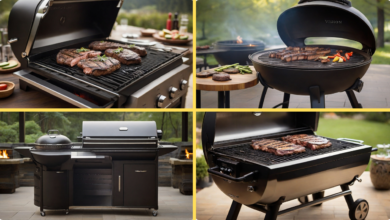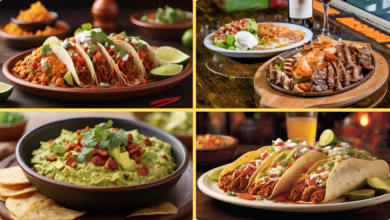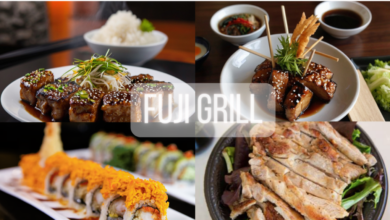
Grilling on the Beach in Florida: A Step-by-Step Guide
Grilling on the beach in Florida is an experience unlike any other. The warm sand beneath your feet, the sound of waves crashing onto shore, and the smell of delicious food cooking over an open flame all blend together to create a truly memorable beach day.
But before you grab your tongs and head for the sand, there are a few steps you need to follow to ensure that your grilling adventure goes smoothly.
Step 1: Check with Local Authorities
Before you bring your grill to the beach, make sure it’s legal to do so. Some beaches may prohibit grilling altogether or only allow certain types of grills. It’s important to check with local authorities first to avoid any unwanted fines or penalties.
Step 2: Choose the Right Grill
When it comes to beach grilling, portable is key. A small charcoal grill is an excellent option as it’s easy to transport and set up. However, propane gas grills can be equally convenient without having to deal with messy briquettes and lighter fluid.
Moreover, stainless steel BBQs with adjustable legs work best for uneven surfaces like sandy shores because they provide stability.
Step 3: Gather Supplies
Aside from the grill itself, there are some other essentials you should pack for a successful day of beach grilling:
– Charcoal or propane
– Grilling tools (tongs, spatula)
– Cutting board
– Knife
– Meat thermometer (for safe cooking temperatures)
– Aluminum foil (for wrapping foods)
– Heat-resistant gloves
Additionally, don’t forget about basic necessities such as sunscreen and plenty of water!
Step 4: Set Up Your Grill
Once you’ve arrived at your desired location on the beach, it’s time to set up your grill. Ensure that it’s on a stable surface away from flammable objects like vegetation or dry palm fronds.
If using a charcoal grill:
Start by placing some newspaper at the bottom of the grill to help ignite the charcoal. Add briquettes, and then light them up with a lighter or matchstick. Spread them evenly and wait for about 20-25 minutes until you see ash forming over the coals…
On The other hand, if using a gas grill:
Connect your propane tank to your grill securely and open up the valve slowly to allow airflow to the burners. Then turn on specific burners based on what you’re cooking.
Step 5: Start Grilling!
Once everything is set up, it’s time to start grilling! Make sure that you have all of your tools at arm’s length so that you don’t have to leave your food unattended.
When grilling, be mindful of wind conditions since gusts can affect temperature regulation control. Keep a close eye on the food as well, turning and moving it regularly to prevent any burning or sticking.
And voila! After some patience and effort, you should now have completed a beachfront char-grill experience!
Summing Up:
Grilling on the beach in Florida can be an ideal way to enjoy the seaside ambiance while savoring delicious food cooked fresh right before your eyes.
By researching local ordinances beforehand, picking out portable models with adjustable legs for stability like stainless steel BBQs being used liberally under sunny skies, gathering essential supplies like felt pads/steel wool etc., then creating optimal heat sources like charcoal or propane tanks once there…
you’ll finally start grilling away!
With these helpful tips on how best to prepare for grilling at Florida beaches (or anywhere else really), go ahead and make some memories that will last forever!.
Frequently Asked Questions About Grilling on the Beach in Florida
When it comes to enjoying the sunny beaches of Florida, there is nothing quite like grilling up some delicious food while taking in the beautiful ocean views. Whether you’re a seasoned griller or a beach newbie, it’s always helpful to know some of the most commonly asked questions about grilling on the beach in Florida. Here are a few things to keep in mind before firing up your grill:
1. Is Grilling Allowed On All Florida Beaches?
Before packing up your grill and heading for the sand, it’s important to check if grilling is even allowed on the beach you plan on visiting. Some cities have specific regulations regarding open flames and cooking equipment on their beaches. These regulations might limit which areas allow for grilling or require permits for using a grill.
2. What Type Of Grill Is Best For The Beach?
When it comes to selecting a beach grill, portability and durability are two key factors that should be considered since you’ll need to carry your gear through sandy terrain and protect it from wind, heat and salt water mist. Gas-powered tabletop models usually work best since they’re easy to transport and light enough not to sink into soft sand.
3. Can You Bring Your Own Charcoal?
Some beaches in Florida only permit gas-powered grills due to concerns about smoky fires or larger fires being difficult to control near crowds of people. So if charcoal is an essential element for your barbecue masterpieces, make certain that the beach allows such type of fuel before arriving with bags full of briquettes.
4. Do You Need Any Special Licenses To Grill On The Beach?
In most cases, no special licenses are required so long as you’re following basic safety rules while using an approved appliance within permitted areas or designated fire rings (if applicable). However, if you plan on serving homemade food at public events or advertising catering services (beach parties), then obtaining proper licensing from county health departments would be mandatory.
5. What’s The Proper Way To Dispose Of Coal And Ashes?
When it comes time to wrap up your beach barbecue, remember that you should never dump coal or ashes directly into the water or sand. Instead, pack them in a large foil container and carry them out from the beach with all of your other garbage items. Be sure to follow local regulations for disposing of these materials properly.
By being mindful of these top questions about grilling on the beach in Florida, you can have fun in the sun without any unwelcome surprises. With a little bit of planning and attention to detail, you’ll be able enjoy some delicious food while soaking up some rays along one of the Sunshine State’s many beautiful shorelines.
The Top 5 Things You Should Know About Grilling on the Beach in Florida
There are few things more quintessentially Floridian than grilling on the beach. With miles of pristine coastline, blue skies, and an endless supply of seafood, grill enthusiasts flock to Florida’s beaches all year round to indulge in this time-honored tradition.
But as with any culinary endeavor, there are some key things you should keep in mind if you want your beach BBQ to be a success. Here are our top 5 tips for grilling on the beach in Florida:
1. Check the rules
Before firing up your grill, it’s important to check with local authorities about any regulations or restrictions that may apply. Some beaches may have designated grilling areas or specific times when grilling is permitted. Others may have bans on open fires altogether due to safety concerns, such as high winds or drought conditions. Ignoring these rules can result in unwanted fines or even legal trouble, so make sure you do your research beforehand.
2. Plan ahead
Grilling on the beach requires a bit of preparation and organization. You’ll need to bring all the necessary equipment including a portable grill (charcoal or gas), fuel source (propane tank or charcoal), utensils (tongs, spatulas, skewers), cooler (for keeping food and drinks chilled), plates, napkins and cutlery. Don’t forget trash bags for disposing properly off all waste generated during grilling.
3. Consider wind & weather conditions
Florida’s coastal breezes can wreak havoc on your grill experience if you’re not prepared! Be sure to position your grill away from the windiest spots and take into account potential changes in weather patterns throughout the day – ranging from light drizzles to heavy afternoon showers– by having adequate cover like umbrellas/ tent overheads available for use.
4. Stick To Small Bites
When it comes to beach-grilling cuisine always think small bites! Large cuts of meat like brisket or pork shoulder can take a while to cook and may be difficult to manage on a portable grill. Instead, opt for smaller items like seafood skewers or chicken wings which can cook quickly and are easy to handle.
5. Be mindful of the waste you generate
One of the biggest drawbacks of beach grilling is the amount of waste generated in terms of charcoal ashes, food scraps, used utensils and bagging trash. Make sure you bring along plenty of garbage bags that are properly labelled so that disposal when leaving becomes easy & convenient.
Grilling on the beach in Florida is an experience that everyone should try at least once! By following these tips, you’ll be well on your way to enjoying delicious grilled foods with family and friends while taking full advantage of all that this stunning state has to offer. Now go pack up those tongs and head out for some fun in the sun!
Tips and Tricks for Safe and Enjoyable Beachside Grilling in Florida
There’s nothing quite like the smell of burgers sizzling on the grill as you relax on a beautiful Florida beach. But before you fire up that grill, it’s important to keep safety in mind. Here are some tips and tricks for safe and enjoyable beachside grilling:
1. Check Local Regulations: Before you set up your grill, check with the local authorities to make sure grilling is allowed on the beach. Many locations have specific rules about where and how grilling can take place.
2. Get a Safe Grilling Spot: Choose an area that is well away from any flammable materials such as dry grass or debris. It’s also important to avoid placing your grill directly on the sand–this can cause it to tip or shift, creating potential hazards.
3. Keep Your Grill Clean: Regular cleaning of your grill is essential for safe use. Brush off charred debris after every use and clean the grates often with a non-toxic cleaner.
4. Use Charcoal Responsibly: If using charcoal, be responsible when disposing of ashes! Make sure they are completely extinguished before tossing them into the garbage or burying them in the sand.
5. Bring Essential Cooking Tools: Don’t forget tongs, spatulas, a meat thermometer, cooking spray and all other necessities! Plus it’s always recommended to pack wet wipes/napkins.
6.Top Quality Meat Choice – It’s said “You are what you eat!” therefore it makes sense to choose meat which has been ethically raised for consumption and could possibly just bring good karma vibes along with its delicious taste!
7.Watch Those Flames- Keep a watchful eye on any flames throughout cooking process so nothing accidentally gets overcooked…or worse…burnt! Always have someone present who has basic idea regarding gas cylinder functioning if you’ve brought one along for this endeavor!
By following these simple tips, you’ll be able to enjoy a safe and delicious grilling experience on the beach. Happy Grilling!
Exploring Your Options: Different Types of Grills for Your Florida Beach BBQ
If you’re planning a beach BBQ in Florida, you have countless options for grills! However, not all types of grills are created equal. Choosing the right grill will make a big difference in your cooking experience and the final outcome of your meal.
Here’s a breakdown of some popular grill options to help you explore your choices:
1. Charcoal Grill
The charcoal grill is one of the most classic choices, and it’s perfect for giving food that smoky flavor. The downside, however, is that charcoal takes longer to heat up than other types of grills. You’ll also need to carry bags of charcoal to the beach which can be cumbersome.
2. Gas Grill
Gas grills use propane or natural gas and are known for their convenience and speed in heating up. Plus you don’t have any ash residue – making clean up much easier after an enjoyable day at the beach.
3. Electric Grill
Electric grills are perfect if you’re looking for something easy to transport but still want those delicious grilled flavors on the go. With no flames or smoke produced during cooking, electric grills are suitable for use in areas with restrictions on open flames.
4. Portable Grill
Portable grills come in various forms such as gas or charcoal-powered ones; this type is best suited when travelling with friends & family members afar from home as it is small enough to fit in your trunk or back seat without taking up too much room and causing discomfort during transportation.
5. Ceramic Grill (Kamado)
Ceramic Grills (also known as Kamados) can be quite heavy which makes them less portable than other options but they do offer incredible versatility when it comes to temperature control and smoking meats & vegetables – they have great insulation properties meaning that they can achieve high temperatures very quickly which guarantees delicious grilled meals!
Ultimately, choosing the right grill depends on your preferences – how much time you want to spend warming it up, your preferred cooking method, and how important portability is to you. Whatever option you choose, make sure to take safety precautions when grilling outdoors, especially in high wind conditions found at the beach. No matter which one you decide on though– I’m sure it’ll add some extra flavor and fun to your Florida beach BBQ! Happy Grilling!
From Prep to Cleanup: The Ultimate Guide to Grilling on Florida’s Beautiful Beaches
There’s nothing quite like grilling on the beach in Florida – the sound of the waves, the salty breeze, and that unmistakable sizzle of fresh seafood hitting a hot grill. But before you start whipping up burgers and kebabs, there are a few things to keep in mind for a successful beach grilling excursion.
Preparation is key when it comes to grilling on the sand, especially if you’re planning on cooking for a larger group. Make sure to bring all necessary equipment – this includes your grill (a portable charcoal or propane version is recommended), fuel supply, cooking utensils, bowls and plates, and cleaning supplies. A folding table can also be handy for setting up your prep station.
Speaking of prep, consider marinating any meats or seafood ahead of time for maximum flavor. This will also help cut down on cook time as you won’t have to wait for seasoning to soak in while already grilling.
When it comes to choosing your ingredients, opt for local offerings such as grouper or snapper from nearby fish markets rather than pre-packaged options from chain stores. This not only supports local businesses but ensures fresher catches.
Now onto the cooking process – first thing’s first: location is everything. Choose a spot away from strong winds to prevent ashes or embers flying into surrounding areas or getting in your food. You will also want somewhere with easy access to water should things get too hot (or accidents happen).
Once your grill is assembled and fired up, arrange your ingredients accordingly based on cooking times – fish typically cooks faster than beef or chicken so save those thicker cuts for later.
Don’t forget about sides! While coleslaw might seem like an obvious go-to there are plenty of other beach-inspired dishes like grilled pineapple slices sprinkled with cinnamon sugar or corn brushed with garlic butter that will take any ordinary BBQ experience over-the-top.
As you reach the end of your meal make sure the fire is properly extinguished – you should have a bucket of sand or water nearby to pour over the coals and ensure no hot spots are left. Lastly, make sure all trash is disposed of properly so as not to litter or detrimentally affect environment.
With these tips in mind, you’re well on your way to becoming a beach grilling pro. Enjoy a beautiful day with friends and family indulging in fresh seafood, refreshing drinks, stunning scenery – and good company.



